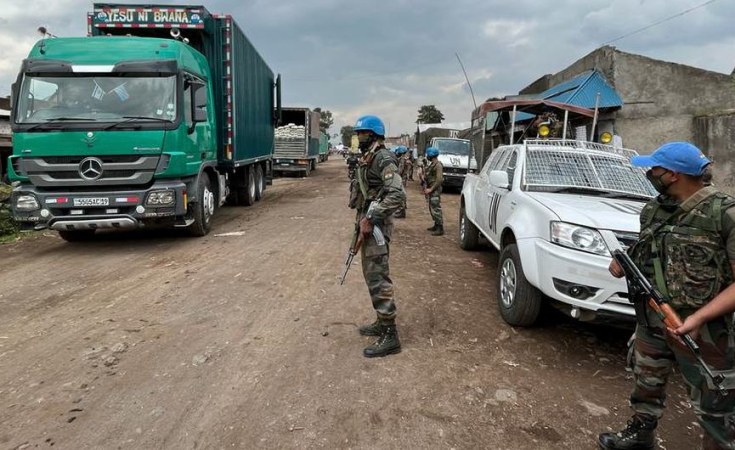This year's International Day of United Nations Peacekeepers honors more than 4,000 blue helmets who have lost their lives serving for peace.
For the past 75 years, UN peacekeepers have served in peace operations in conflict-affected areas in Africa, Asia, Europe, and the Middle East.
The blue helmets help countries torn by conflicts create conditions for lasting peace. However, they operate under strict guidelines and are often unable to stabilize volatile situations or even protect civilians.
The May 29 commemoration revolves around the theme "Fit for the Future: Building Better Together."
Paying tribute to soldiers who died
Nicholas Haysom, head of the United Nations mission in South Sudan (UNMISS), said he observes the day by remembering peacekeeping soldiers who died during deployments.
"Sadly, some of our colleagues have paid the ultimate price in the line of duty," Haysom said. "Their legacy lives on and inspires us. We have a vital role to save lives but we must also build local capacity and look for durable and longer-term solutions."
Africa's youngest nation, South Sudan has the highest number of UN troops with 14,200 military personnel, police officers, and civilian workers as well as small contingents of experts, staff officers and volunteers.
The UN Security Council has extended the UNMISS mandate for one year until April 30, 2025, maintaining its force levels to cope with the continuing political, security, and humanitarian challenges.
Shedding more light on the role played by peacekeepers, Haysom said peacekeepers work to protect civilians, but ultimately, a safe and secure future will only come through inclusive political solutions.
"Peacekeepers can never be a substitute for the political role of the parties to win conflicts," Haysom told DW.
"We have seen the harsh struggle of South Sudanese women and men, especially in the villages. We have witnessed the significant role played by UNMISS and UN partners to alleviate those hardships."
'Building better together'
This year's commemoration also honors the "remarkable uniformed and civilian personnel" by highlighting their work.
Warrant Officer Hwongi Rwang, a Nigerian military observer at UNMISS in South Sudan's capital, Juba, points out his crucial role on the field.
"We are the eyes of the [UN] mission because we go to patrol," he told DW. "We go to the field. We observe. We monitor. Anything we find there, we see. The Force Commander will not be there. So we are his eyes."
Rwang's main task is to monitor and assess post-conflict agreements such as cease-fires to ensure that fighting between factions stops for a particular duration, especially to facilitate peace talks.
Meanwhile, Major Apoinero Kanyanda from Rwanda, a chief operations officer at UNMISS, prepares operational strategies and plans and allocates equipment, personnel and resources.
"The thing which makes me happy is I and my country contributing in seeing peace coming in this country and the population being stable," Kanyanda said.
Kanyanda emphasizes that he would be most happy if permanent peace prevails in South Sudan, to avoid mass killings similar to the one that occurred in his country Rwanda, where nearly 1 million ethnic Tutsi and moderate Hutu were systematically murdered in 1994.
Sour reputation in some African countries
Although the UN peacekeeping missions strive for peace in the countries they serve, they have clashed with some administrations in Africa.
In countries like the Democratic Republic of Congo (DRC), Mali, Central African Republic (CAR), and even South Sudan, the UN troops have had little success.
In October 2023, UN soldiers evacuated their camp in the volatile north of Mali amid jihadist and separatist fighting. Mali's military rulers, who took over in 2020, had ordered the UN to leave, saying the peacekeepers had failed.
Mali's military rulers have turned to the Wagner Group, a private Russian military group, to help them deal with the jihadist threats there.
In April 2024, UN peacekeepers left bases in Congo's restive South Jivu province after a more than 20-year presence. They were replaced by Southern African Development Community (SADC) troops.
The SADC mission in Congo started deploying in December after Congo, one of SADC's 16 members, sought support under the bloc's mutual defense pact.
Torturers deployed as UN peacekeepers
Peacekeeping operations, individual soldiers and entire contingents have, over the years, been embroiled in scandals, which the UN has always been swift to condemn. Critics say peacekeeping missions have been ineffective, while those defending peacekeeping say they have saved countless lives.
An investigation by DW, Sweden-based investigative outlet Netra News, and German newspaper Süddeutsche Zeitung revealed that some officers implicated in torture and killings have been deployed as UN peacekeepers.
The officers had been part of the Rapid Action Battalion (RAB), an elite force in Bangladesh. The investigation, published last year, showed that RAB commits torture, murder and abductions. Its targets were alleged criminals, opposition activists, and human rights defenders. They were later tasked as peacekeepers to protect vulnerable communities.
Several requests from DW, Netra News and Süddeutsche Zeitung for an on-camera interview with the UN Department of Peacekeeping Operations were all declined. Instead, the UN responded in writing to the findings. "We do not have the resources to screen each and every person and have a long-standing policy that places specific responsibility on troop and police-contributing countries," a spokesman wrote.
After DW published its investigation, Bangladesh's military called it "false and fallacious," claiming the investigation was a "misleading portrayal of Bangladesh Army personnel in UN Peacekeeping Missions."
Edited by: Keith Walker
This article has been adapted by Okeri Ngutjinazo from a report on DW's AfricaLink, a daily podcast packed with news, politics, culture and more. You can listen and follow AfricaLink wherever you get your podcasts


